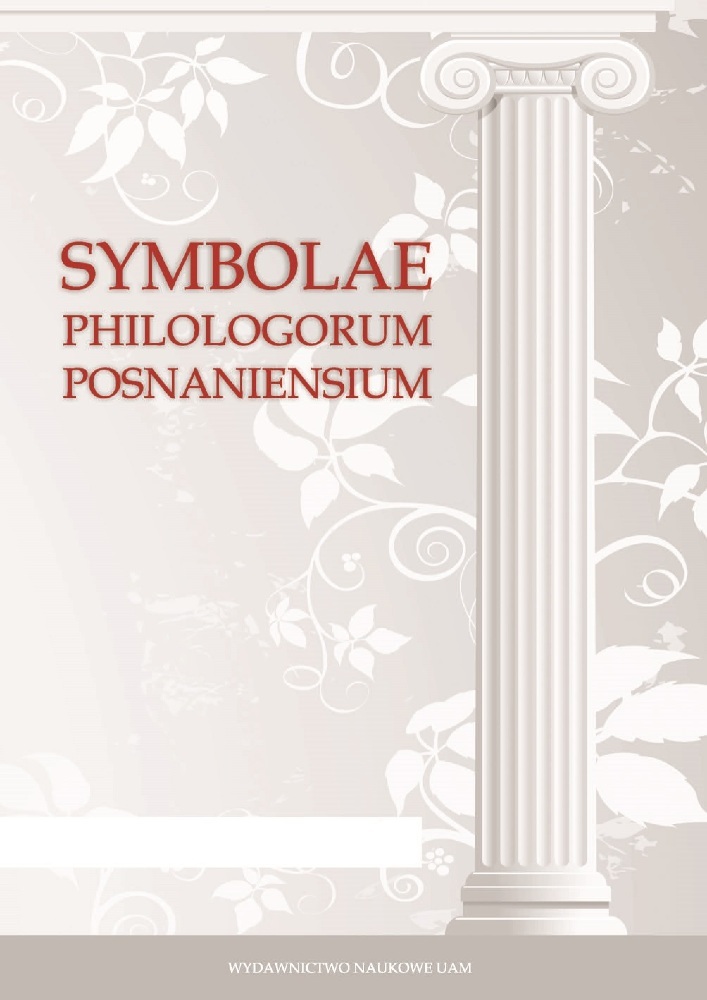Abstrakt
In books VI and VII of Apuleius’ Metamorphoses we find the robbers delivering some orations, which imitate
the genus deliberativum: they display sollemnity and refined elegance to such an extent, that the reader, being
aware that they proceed from the most heinous rogue’s lips, cannot but smile by himself.
Composing this part of his tale, Apuleius also falls back on and re-treats some elements of the greek novel, in
particular the representation of the band of robbers like a sort of perverted state.
In this article I will first show the resemblances that Apuleius’ rogue-tales share with the same places of the
Greek novels’ writers, then I will continue to examine the speeches found in books VI and VII.
I will demonstrate with how much elaboration Apuleius has amplified and augmented these tales, which the
Greek novelists have merely outlined, for the sake of playing on extant literature, and I will clarify to what
extent we can understand this playing on literature as a parody.
Bibliografia
Apuleio, Le metamorfosi o l’asino d’oro, introduzione, traduzione e note di L. Niccolini, Milano 2006.
Apulei Metamorphoseon libri XI, recognovit brevique adnotatione critica instruxit M. Zimmeraman, Oxonii 2012.
L. Apuleii Madaurensis, Opera omnia ex optimis codicibus edidit et rerum indicem adiecit
G.F. Hildebrand, Lipsiae 1843.
L. Apuleii Madaurensis, Opera quae quidem extant omnia et in primis de asino aureo libri XI, cum eruditissimis Philippi Beroaldi commentariis, Basileae 1560.
Apuleius, Metamorphoses, Book IV, 1–27. text, introd and comm. by Hijmans, Paardt, Smits, Westendorp, Westerbrink, Groningen 1977.
Bakhtin, 1981: M.M. Bakhtin, The Dialogic Imagination, trans. Caryl Emerson and Michael Holquist, Austin 1981.
Callebat 1968: L. Callebat, Sermo Cotidianus dans le Métamorphoses d’Apulée, Caen 1968.
Facchini 2011: B. Facchini, Giurisprudenza da favola:note sul lessico giuridico delle Metamorfosi di Apuleio, “Lexis” (29) 2011, pp. 301–323.
Finkelpearl 1998: E.D. Finkelpearl, Metamorphosis of Language in Apuleius: a Study of Allusion in the Novel, Ann Arbor 1998.
Flam-Zuckermann 1970: L. Flam-Zuckermann, A propos de d’une inscription de Suisse: études sur le phenomène du brigandage, Latomus 29, 1970, pp. 451–473.
Frangoulidis 1994: S.A. Frangoulidis, Self-Imitation in Apuleius’ Tales of Tlepolemus-Haemus and Thrasyleon, “Mnemosyne” 1994 (v. 45, f. 3), pp. 337–348.
Frangoulidis: S.A. Frangoulidis, Theatre and spectacle in Apuleius’ tale of the robber Thrasyleon, “Griechische-römische Komödie und Tragödie” (3), pp. 113–135.
Frangoulidis 1991: S.A. Frangoulidis, Vergil’s tale of Trojan Horse in Apuleius’ robber-tale of Thrasyleon, “La parola del passato” 1991, pp. 95–111.
Gianotti 1981: G.F. Gianotti, Memoria letteraria e giuridica nell’episodio di Chryseros e Lamachus (Apul. met. 4,9–11), “Quaderni di Filologia Classica” 1981 III, pp. 59–83.
Grünewald 1999: T. Grünewald, Räuber, Rebellen, Rächer: Studien zu Latrones im Römischen Reich, Wiesbaden 1999.
Harrison 2013: S.J. Harrison, Framing the Ass, literary texture in Apuleius’ Metamorphoses,
Oxford 2013.
Harrison 2000: S.J. Harrison, Apuleius: A Latin Sophist, Oxford 2000.
Hobsbawm 1981: E. Hobsbawm, Bandits, New York 1981.
Janni 2007: P. Janni, Apuleio, i briganti e la sepoltura in mare, “Quaderni urbinati di cultura classica” 2007, pp. 125–134.
Penna 1985: A. La Penna, Una novella di Apuleio e l’Iliupersis virgiliana, “Maia” 1985, pp.
–147.
Lazzarini 1985: C. Lazzarini, Il modello virgiliano nel lessico delle metamorfosi di Apuleio, “Studi Classici e Orientali” 1985, pp. 131–160.
Loporcaro 1992: M. Loporcaro, Eroi screditati dal testi, “Maia” 1992, pp. 65–77.
May 2006: R. May, Apuleius and Drama, The ass on the stage, Oxford 2006.
Mazzarino 1950: A. Mazzarino, La Milesia e Apuleio, Torino 1950.
Mackay 1963, P.A. Mackay, Klephtika: The Tradition of the Tale of Banditry in Apuleius, “Greece and Rome” 1963, pp. 147–152.
McMullen 1967: R. McMullen, Enemies of the Roman Order, Treason, Unrest and Alienation in the Roman Empire, Oxford 1967.
McMullen 1967: R. McMullen, Enemies of the Roman Order, Treason, Unrest and Alienation in the Roman Empire, Oxford 1967.
Médan 1927: P. Médan, La latinité d’Apulée dans le Métamorphoses, Paris 1927.
Nicolini 2000: L. Nicolini, La novella di Carite e Tlepolemo, Napoli 2000.
Palacios 2005: J. Palacios, Las historias de Làmaco, Alcimo y Trasyleòn, Argos 2005, pp. 91–106.
Paratore 1942: E. Paratore, La novella in Apuleio, Messina 1942.
Pasetti 2007: L. Pasetti, Plauto in Apuleio, Bologna 2007.
Perry 1923: B.E. Perry, Some Aspects of the Literary Art of Apuleius in the Metamorphoses,
“Transactions and Proceedings of the American Philological Association 1923, pp. 196–222.
Rohde 1914: E.Rohde, Der Griechischer Roman und seine Verläufer, Leipzig 1914.
Scazzoso 1951: P. Scazzoso Le metamorfosi di Apuleio, studio critico sul significato del romanzo, Milano 1951.
Shaw 2006: B.D. Shaw, Il bandito, “L’uomo Romano”a cura di A. Giardina, Bari 2006.
Shaw 1984: B.D. Shaw, Bandits in the Roman Empire, Past and Present 1984, pp. 3–52.
Tatum 1979: J. Tatum, Apuleius and the Golden Ass, Ithaca and London 1979.
Van der Paardt 1978: R. Th. Van der Paardt, Various Aspects of narrative technique in Apuleius’ Metamorphoses, “Aspects of Apuleius the Golden Ass”, ed. Hijmans-Paardt, Groningen–Bouma 1978.
Winkler 1985: J.J. Winkler, Auctor and Actor, a Narratological Reading of Apuleius’s The Golden Ass, Berkeley and Los Angeles 1985.
Westerbrink 1978: A.G. Westerbrink, Some parodies in Apuleius’ Metamorphoses, “Aspects of Apuleius’ the Golden Ass”, ed. Hijmans-Paardt, Groningen 1978.
Licencja
